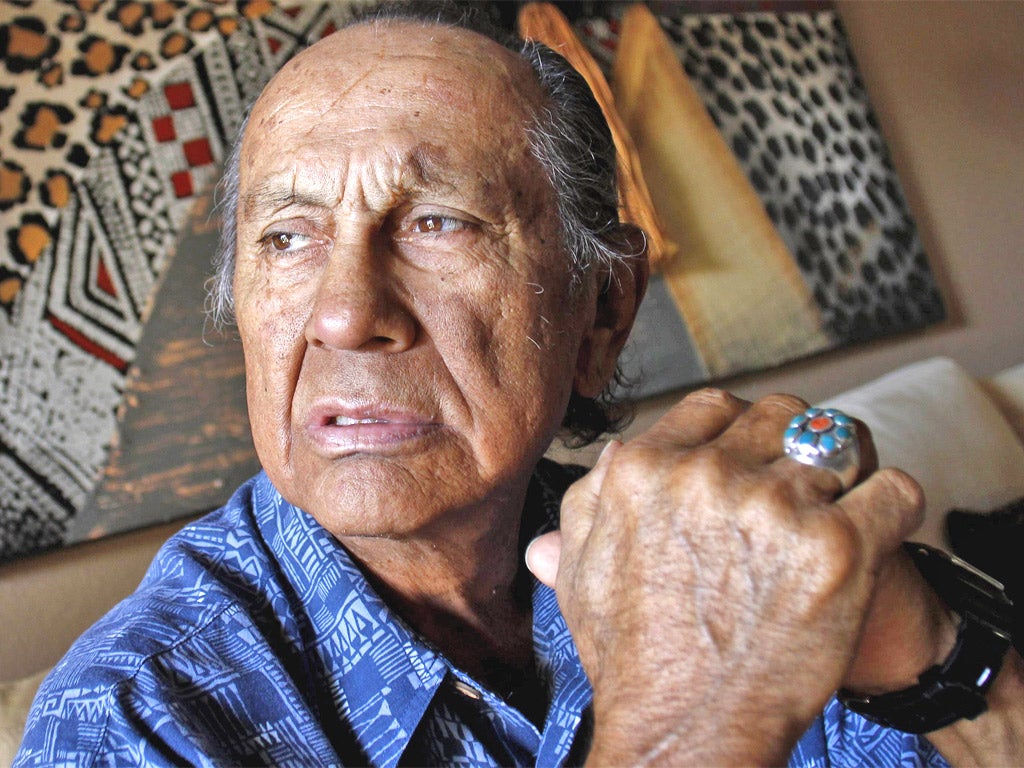
Russell Means, it was said, was the best known American Indian since Sitting Bull and Crazy Horse. The Washington Post called him "the biggest, baddest, meanest, angriest, most famous Indian activist of the late 20th century" He used militant protest and violence, politics, and even showbusiness to further the cause. He was as divisive as he was charismatic. Above all however, Means' life was a reminder of the terrible injustices visited upon his people by the white men who built the United States.
Born on the Lakota Sioux Reservation at Pine Ridge, South Dakota, Means moved as a young boy to California, where his father worked in the Second World War shipyards. He spent much of the 1960s as a drifter across the West, before moving back in 1969 to South Dakota, where his life took shape and purpose.
That year he met Dennis Banks, a founder of AIM, the American Indian Movement that had been founded in 1968. AIM was a creature of those turbulent times, inspired by the civil rights movement that had achieved such gains for African Americans. By 1971, Means was its national co-ordinator. The movement, he said, had finally provided him "a way to be a real Indian."
With AIM, Means was involved in several spectacular protests that drew national, and then international, attention to the Indian cause. In 1970, he and other activists briefly took over Mount Rushmore in the Black Hills of South Dakota, sacred to the Sioux, where he urinated over the carved head of George Washington. The act, he declared, symbolised what "most Indians feel about the faces chiselled out of our holy land."
On Thanksgiving Day that year, AIM members occupied the Mayflower II, replica of the ship that brought the Pilgrim Fathers to America, in Plymouth, Massachusetts. In 1972 Means was a leader of a cross country "caravan" to Washington DC that culminated in an occupation of the Bureau of Indian Affairs.
His and AIM's most famous operation came the following year with the seizure of the hamlet of Wounded Knee on the Pine Ridge reservation, the site of the 1890 massacre of Sioux men women and children by the US 7th Cavalry that is generally held to mark the end of the 19th century Indian wars. Originating in an internal tribal dispute, the protest turned into a confrontation between the occupiers and hundreds of US marshals and FBI agents, backed by armoured personnel carriers.
Means was later criticised for his militant ways, which critics claimed divided the Indian movement and alienated potential sympathisers. But he was unrepentant. "Sometimes there has to be violence to force the white man to listen. If we seize Wounded Knee, either we'll force the federal government to kill us all like they did 83 years ago or they … negotiate and meet our demands."
The stand-off, lasting 71 days and during which two people died, ended peacefully. Means and scores of fellow activists were, however, indicted and put on trial, only for the case to be dismissed because of prosecutorial misconduct.
Throughout the 1970s high-profile activism and various tangles with the law, including a one-year jail term for rioting, kept Means in the headlines. But his focus began to switch to politics. In 1983 he agreed to be the running mate of Hustler magazine publisher Larry Flint in the latter's bid for the White House. Four years later he ran in his own right for the Libertarian Party nomination, but was defeated by Ron Paul, the Congressman who himself would later twice seek the presidency as a Republican.
In 1988 he left AIM and concentrated on acting. His craggy looks and long, black braided hair, combined with his speaking ability, made him a natural. He appeared in dozens of films and TV shows, including The Last of the Mohicans in 1992 and the 1995 Disney animation Pocahontas, in which he was the voice for the Indian chief, father of the heroine of the title.
In Means' later years, the fortunes of the Indians slowly improved. Their number had risen from barely 500,000 in 1900 to some 5.2m in 2010, according to that year's national census, while casino operations were generating new income. But reservations were still scarred by poverty and alcoholism, and Means never gave up he fight, vowing to be remembered "not as an activist but as an American Indian patriot."
His people "were digging into trash now for food and whatever," he said in a 2010 interview, his voice cracking with emotion. "When I see that … I know who my ancestors are and we're reduced to that." The following year he was diagnosed with inoperable cancer but refused radiation treatment and chemotherapy, insisting on traditional native American Indian remedies. "I'm not going to argue with the Great Mystery," he declared. "Lakota belief is that death is a change of worlds. And I believe like my dad believed."
Rupert Cornwell
Russell Charles Means, American Indian activist and actor: born Pine Ridge Reservation, South Dakota 10 November 1939; married five times (nine children); died Porcupine, South Dakota 22 October 2012.
Subscribe to Independent Premium to bookmark this article
Want to bookmark your favourite articles and stories to read or reference later? Start your Independent Premium subscription today.

Join our commenting forum
Join thought-provoking conversations, follow other Independent readers and see their replies